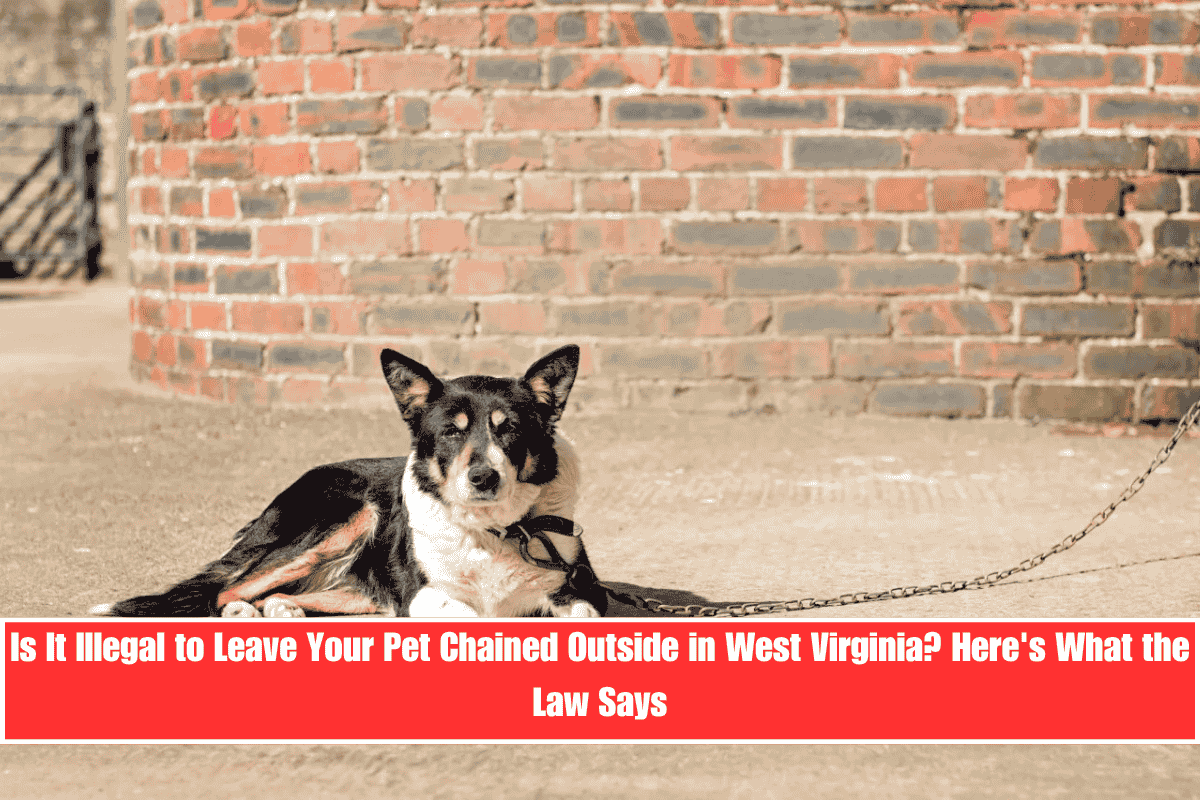Leaving your pet chained outside in West Virginia is a legal gray area that depends on both state law and local ordinances. Here’s a detailed breakdown:
State Law
- No Statewide Ban: There is no blanket prohibition on tethering or chaining dogs in West Virginia. State law allows tethering, but it is illegal to “cruelly chain” or tether an animal. This means that while chaining is generally permitted, it is considered animal cruelty if it deprives the animal of necessary care—such as food, water, shelter, exercise, or veterinary care—or if the animal is intentionally, knowingly, or recklessly subjected to cruel chaining.
- Animal Cruelty: Intentional, knowing, or reckless cruel chaining is a misdemeanor. Aggravated cruelty (such as causing serious injury or death) is a felony.
- Abandonment: Abandoning a dog at a place of business (like a vet or kennel) for more than seven days is considered abandonment, but there is little definition or specific punishment for general abandonment if the animal is not left without necessities.
Local Ordinances
Many cities and counties in West Virginia have stricter regulations:
- Charleston:
- Tethers must use a proper collar or harness to prevent injury.
- Dogs cannot be tethered for more than two continuous hours (one hour in extreme temperatures), with required breaks between tethering sessions.
- The tether must be at least 10 feet long and weigh no more than 1/8 of the dog’s body weight.
- Tethered dogs must not be left in a way that causes injury, strangulation, or entanglement.
- Kanawha County and Dunbar:
- Tethering is only allowed for the time necessary to complete a temporary task, and the owner must be outside with the dog and able to see it at all times, except for brief periods (up to 15 minutes, four times per day).
- The tether must be at least 10 feet long, free from tangles, and weigh no more than 1/8 of the dog’s weight.
- Dogs must be at least six months old to be tethered, and not tethered during extreme weather unless adequate provisions are made.
- The tether must be attached to a proper collar or harness, not directly to the dog’s neck.
- Exceptions: Hunting dogs are often exempt from these local restrictions.
Proposed and Pending State Legislation
- House Bill 4673 (2022): This proposed bill would provide more specific rules for tethering, require tethers to be three times the length of the dog or at least 10 feet (whichever is longer), and increase penalties for violations.
- Current Status: As of now, this bill has not been enacted into law, but it reflects ongoing efforts to regulate tethering more strictly at the state level.
Table
| Jurisdiction | Is Chaining Allowed? | Key Restrictions/Requirements |
|---|---|---|
| Statewide | Yes, but not cruelly | Must provide food, water, shelter, etc. |
| Charleston | Yes, with strict limits | Time limits, tether specs, weather rules |
| Kanawha County | Only for temporary tasks | Owner must be present, tether specs |
| Dunbar | Only for temporary tasks | Owner must be present, tether specs |
Leaving your pet chained outside is not outright illegal in West Virginia under state law, but it is illegal if done cruelly or without providing necessary care. Many local governments have stricter rules, often limiting tethering to short periods and requiring the owner to be present. Always check your local ordinances for the most accurate and up-to-date regulations.
Sources
[1] https://www.peta.org/issues/animal-companion-issues/ordinances/west-virginia/charleston-west-virginia/
[2] https://dogtime.com/reference/106761-west-virginia-dog-laws-2023-rabies-dog-bites-dog-cruelty-and-dog-chains
[3] https://codelibrary.amlegal.com/codes/dunbar/latest/dunbar_wv/0-0-0-5630
[4] https://fohowv.org/wp-content/uploads/2013/10/Kanawha-final-tethering-ordinance.pdf
[5] https://www.peta.org/issues/animal-companion-issues/ordinances/west-virginia/kanawha-county-west-virginia/












